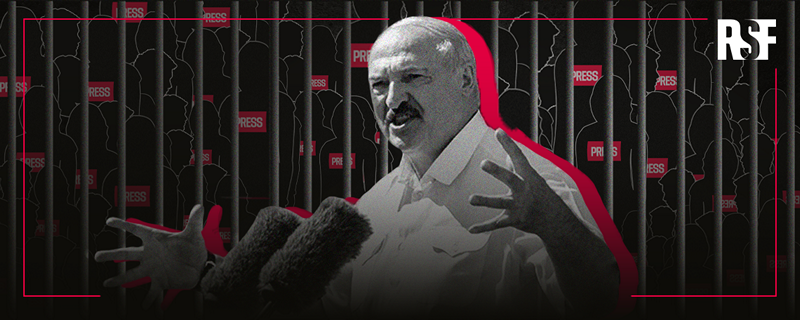Belarus: ahead of sham election, RSF files ICC complaint for Lukashenko’s crimes against humanity targeting journalists
After five years of inflicting an unprecedented crackdown on the press, Alexander Lukashenko is set to run for a seventh presidential term on Sunday, 26 January. Reporters Without Borders (RSF) has filed a complaint with the International Criminal Court (ICC) against the Belarusian leader for crimes against humanity, as journalists continue to be overwhelmingly targeted by his regime.

“The electoral farce will likely proceed without a hitch, free from the counterweight of independent media, ensuring Lukashenko’s victory over four puppet candidates. For five years, the Belarusian regime has systematically persecuted independent voices, starting with journalists. To combat this glaring impunity, RSF is filing a complaint for crimes against humanity committed against Belarusian journalists. We call on Prosecutor Karim Khan to investigate and prosecute those responsible.
As the presidential election approaches, Belarus’ state media are delivering propaganda that portrays independent journalists and media outlets as extremists, echoing the logic of the repressive laws introduced by Lukashenko’s regime. From 15 to 17 January, the state-run television network ONT aired interviews conducted by a propagandist with three imprisoned journalists from Radyio Svaboda (the Belarusian service of the US-funded broadcaster Radio Free Europe/Radio Liberty, RFE/RL): Ihar Karnei, Ihar Losik, and Andrei Kuznechyk. Due to the manipulated footage and fierce intimidation of these journalists, they appeared to express regret for their work at RFE/RL, portrayed as an extremist outlet that spreads fake news, incites riots, and promotes overthrowing the government.
A state policy of repression
Since his contested re-election in August 2020, Alexander Lukashenko has orchestrated a widespread, systematic campaign of persecution against journalists, aiming for their complete eradication. Their “crime” is that they dared to cover unprecedented peaceful protests demanding free and transparent elections — and the aftermath of these demonstrations. As early as 2021, Lukashenko declared that efforts to “restore order in the information space” were nearing completion.
“Particularly serious facts have been analysed by RSF under the framework of the ICC’s Statute and jurisprudence, they clearly constitute crimes against humanity of imprisonment, persecution and forced displacement of Belarusian journalists due to their work. RSF calls on the ICC Prosecutor to include these crimes against journalists in its preliminary investigation. We welcome Lithuania’s referral of Lukashenko’s crimes to the ICC and urge other States Parties to the Rome Statute that host Belarusian journalists to join Lithuania in referring this case to the ICC.
RSF has documented this state policy, with help from the Belarusian Association of Journalists (BAJ), its partner. The findings include 589 cases of arbitrary arrests of independent media professionals in a country that had about 2,000 journalists just five years ago. At least 43 journalists are still in prison, including Maryna Zolatava, the former editor-in-chief of the country’s most widely read media outlet, TUT.BY, which was shut down by the regime in 2021.
Journalists forced into exile
Mass arrests, arbitrary detentions, violence, destruction of professional equipment, forced erasure of images, raids, shuttered media outlets, widely-circulated videos of humiliating forced confessions, censorship, and various forms of pressure — these acts of persecution, constituting crimes against humanity, have propelled the mass exodus of Belarusian journalists, primarily to Poland and Lithuania. Forced exile alone is classified as a crime against humanity under the category of forcible transfer of population.
Even abroad, journalists are not safe. The illegitimate president has sought to create an inescapable climate of terror, going as far as diverting a plane flying through Belarusian airspace in May 2021 to arrest an exiled blogger. Within 48 hours of this unprecedented tactic, RSF filed a complaint against Alexander Lukashenko with the Lithuanian Prosecutor General’s Office for “hijacking of an aircraft with terrorist intent,” leading to the opening of an investigation. Beyond in absentia prosecutions and the intimidation of relatives remaining in Belarus, some journalists now face asset seizures by the authorities.
For the journalists still in Belarus, often due to family obligations, abandoning journalism does not guarantee any reprieve. Authorities target them for past publications, often under accusations of “extremism.” Fearful of repercussions, their families sometimes refuse to publicise their detention.
Widespread persecution
In its complaint, RSF provided the ICC Prosecutor with detailed evidence and statistics illustrating the scope and severity of these crimes, demonstrating the systematic and state-driven nature of the attack on Belarusian journalists.
Arrests and imprisonments since August 2020:
- 589 arbitrary arrests targeting 397 media professionals (some arrested multiple times).
- 43 journalists remain in prison.
The forced displacement of Belarusian journalists, according to statistics from the BAJ:
- Between 500 and 600 Belarusian journalists have been forced into exile.
- Around 200 Belarusian journalists have sought refuge in Lithuania.
- Around 300 Belarusian journalists have sought refuge in Poland.
Belarus, one of the world’s largest jails for journalists:
- Ranked 4th in the world for the highest number of imprisoned journalists as of December 2024, behind China, Myanmar, and Israel.
- Holds the highest per capita rate of imprisoned journalists worldwide.
 @bajmedia
@bajmedia
